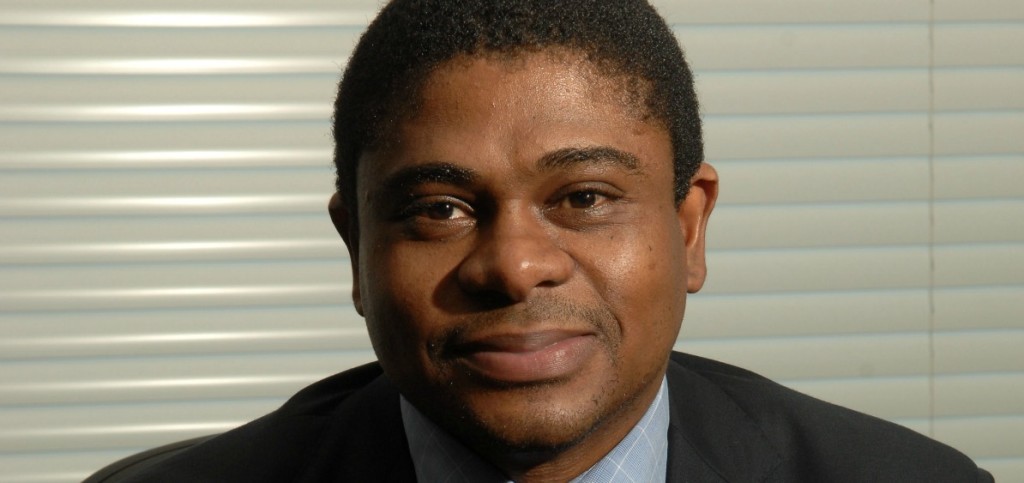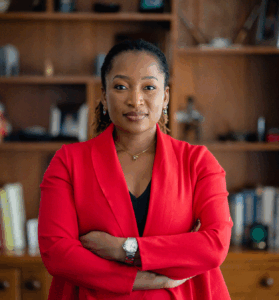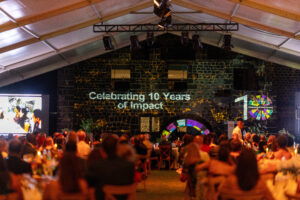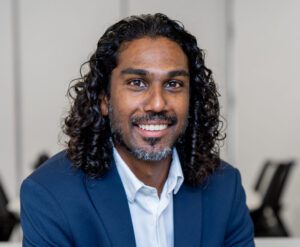Bashi Gaetsaloe is the Managing Director of the Botswana Development Corporation (BDC), the investment arm of the Botswana government. BDC makes investments with debt funding or equity funding to grow new industries, create jobs, grow the private sector and diversify the economy. Prior to the BDC, Gaetsaloe was a country manager for Accenture in Botswana where he advised different industries on how to grow. Gaetsaloe was on campus as a Distinguished Guest Speaker and spoke to students about his journey as an entrepreneur.
What has your experience on campus been like?
It’s been interesting, different, inspiring. I spent the morning trying to wrap my head around the learning model. That was very intriguing. You guys are pulling from so many different places and at the same time, you are on a wave of creating new things so that was exciting for me. As an employer as well, it makes a lot of sense to me. The starting point for learning really being the employers themselves and what we are looking for from new employees is really good.
Then later on, I got to meet the students and I was surprisingly inspired by their grasp of business. They are all first year students and I gave them a complex task challenge to do. I was blown away by their responses and thinking process. I gave them an assignment based on a question that we’re trying to answer at the BDC: whether or not we should create a law around citizen empowerment in Botswana. Their answers showed a strong understanding of an entrepreneurship ecosystem. They were able to look at the economy from both a micro and macro perspective.
What was your university experience like?
My grounding in university was very much a liberal arts education. It took a very wide view that said “it’s difficult to turn you an expert in four years. We would rather give you the tools that will help you learn how to learn, write, inquire and explore.” That’s why I understand what you are doing here. I’m drawn to it.
Do you think that there was anything missing from your experience?
I won’t say that anything was missing from my experience necessarily, but as an employer, there are certain skills that I value the most in new recruits. I place a premium on being able to write very well. It presumes that you are able to think clearly and critically and also argue coherently. I also value the ability of people to direct themselves and achieve an outcome. The outcome can either be clearly or unclearly defined but what’s important is if you can manage yourself to meet deadlines. These are skills that I don’t see in the young people who come into the workforce so to have a university that says it’s going to teach that, not as an add on or an elective but is at the very core of what you do is very inspiring.
What was your #ALUmoment?
I’d say it was the Q&A during my lunch with students. The level and quality of the questions asked both surprised and provoked me. I went away having thought about my own journey of building my business. Here I was sitting among young people and no one appeared to be shy, or afraid to raise their hands. When they did raise their hands they asked very insightful questions. I felt challenged. I felt like I didn’t always have the answer. Sometimes with young people it’s easy to pretend you have the answer even when you don’t but I felt like there was a genuine moment of enquiry even if I didn’t know what the answer was. To come in as an expert and have people challenge you and throw ideas and not be afraid to express it, that was my ALU moment.
Finish these sentences:
Education is …
Education is about building yourself, not finding yourself but reinventing yourself. We have different notions of who we are at different times and many of those notions go quite untested. It’s important that as you get older, you are able to say “I’m actually not a good tennis player. I’m better at something else.” So you reinvent yourself in a way that you build on your strengths all the time.
Leadership is …
Leadership is inspiration. Leadership is also about results but mostly inspiration. If I look at the best leaders, from the great Nelson Mandela to a young woman that I met recently in a small village in Botswana, I see inspiration. I was there because I was on a presidential task team to develop Vision 2036 which is a new national vision for Botswana and we went round to talk to people all over the country and I met this woman who had a business where she reared goats. She said to me “work is love. I love my goats. I wake up and I dream about these goats. I know them by name.” That phrase was really inspiring for me. Here was someone who was a leader in their own right. Wherever you are I think leadership is about inspiring people.
Universities and the workplace should work together because …
Universities and the workplace should work together because it is a circle and it is a symbiotic relationship. Gone are the days when academics locked themselves up in an ivory tower. The world has changed so much and there is now a blurred line between what is work and what is play. The fact that I can be on this Indian Ocean island and still run a meeting in Botswana suggests the blurred line. It extends to the academic world as well. People are going to school so that they can create jobs or get a job. It only makes sense that we can get them to figure out what the future is asking them for.
What are some of the important lessons that you have learned throughout your career?
The first one is around decision making. People tend to think that decision making is around big bold things that everyone can feel or that the decision must reverberate across the organisation but I don’t think so. For me, decision making is about understanding the pros and cons of anything. There’s both a quantitative and qualitative side to it. You have to ask yourself, “is this taking me close to my vision?” A decision can be “I’ve been at this for two years and it’s not working. I’m going to stop it and try something else.” You need to learn to make decisions based on the cost-benefit analysis and if it’s moving you close to your vision. Learn to identify the moments you are indecisive. Decisions are like a muscle. You need to train it so you can make a faster ones.
The second lesson is that small things matter. If a business can’t get the small things right, then it means they can’t the big things right. A company is a big beast and if you can’t organise mail to get delivered efficiently or a simple travel booking, it starts to tell you something about the business. “If I call and leave a message, does the message actually get delivered?” If you can get those elements right, then it means you are focused on achieving the right outcomes. Everything around a business is important.
The last thing is, business is not just what you want to do but who you want to be as a business. The “be’s” far outway the “to-do’s.” The to-do’s are things like “we want to grow revenue, we want to bring more customers in, we want to penetrate the Nigerian market.” These are great and you should go after them. What fuels this for me is what sort of company you want to be. For me, at the BDC, we want to be the company that gets things done and can make things happen. Don’t forget the be’s. If you do, it will let you down on the to-do’s. Everyday ask the question, what sort of company do we want to be and are we becoming that? At every level of leadership focus on the be’s.






